- Home
- Warren Hately
After the Apocalypse Book 1 Resurrection: a zombie apocalypse political action thriller
After the Apocalypse Book 1 Resurrection: a zombie apocalypse political action thriller Read online
After The Apocalypse
*
Book 1
Resurrection
by Warren Hately
Contact the author at wereviking @ hotmail.com
or follow @wereviking on Twitter
*
For giveaways and regular updates
visit warrenhately.com
Cover by Ryan Schwarz
All characters appearing in this work are fictitious. Any resemblance to real persons, living or dead, is purely coincidental.
THEY CHOSE OPEN ground on account of the terrain, the ruins of the last nameless township on the outskirts of Columbus throwing up too many red flags for Tom to conscience sheltering his family there. There’d been a school once, beside their campsite, and the long row of sagging fence and the old playing field beyond gave line of sight to soothe a man keen for sleep.
And then the RV and a flat-bed truck pulled in.
The diesel vehicles were noisy, the ragged camper seen better days with the greasy black smoke trying hard not to billow out its back. Working vehicles were far and few these days, but there they were, like mythological creatures come to life. The dozen people straddling the truck gave Tom pause if their arrival already hadn’t. Lucas was away gathering firewood and nowhere in sight, while his older sister Lilianna was the opposite, caught like a rabbit in the headlights of their actual headlights as the hour angled on towards dusk.
Those lights and the hastening time of day exposed the errant simplicity of the Vanicek camp. Like most folks, they were traveling on foot, and they’d become seasoned at this sort of thing, lugging just the bare essentials, the early June air making the outdoors almost like a camping trip from years past, or at least if you squinted right. Under the scrutiny of the nobodies now intruding on their safe zone, the three bedrolls with backpacks and the lacquered black limbs of Tom’s longbow sitting abandoned and out of reach amid it all offered a brief, but accurate sketch of their numbers and their capacity to fight back – much to Tom’s regret.
He returned to his daughter at an unhurried pace despite the clamor in his chest, silently cursing his lack of recent practice riding the adrenalin charge as he made casual fists to still shaking hands. For her part, Lilianna was a good girl, long hair bound tight and out of sight, and they’d talked about the problems she could face once they reached the City and its promise of other people.
“Stay cool, honey,” Tom said as he reached her.
Lila stood, smoothing down the moleskins they’d found during their trek almost a week ago. She had her back to the new vehicles just idling there, and for a moment Tom was thrown by his daughter’s subdued mask. But her pale blue eyes tingled with fear, and they touched hands – her father retrieving his longbow in the same motion – while Lilianna stayed as close as she dared, a semaphore for the hard-fought paternal protection she remained under.
And then she drew the Bowie knife from the small of her father’s back.
“You’re a good girl, Lila,” Tom said. “Stay calm and this might be nothing. I love you.”
“I love you too, dad.”
The things they’d been through, this could be just another of those terse, quick, shockingly quick confessionals meant to serve as last words if all hell did go awry. They both knew it, yet neither of them were strangers to such fears.
“Where’s Luke?” Lilianna asked.
“He crossed the fence,” Tom said. “Had the rifle with him. Made him take it.”
“Good.”
It couldn’t be said Lila relaxed, but some of the tension went out of her. Tom sensed it – sensed it like he always had. And just as sure, he knew Lilianna held her doubts still. Tom had his own, imagining his eleven-year-old out in the gathering dark.
The boy could shoot. The question was if he would.
*
THE ENGINE CUT out on the flat-bed and Tom only then realized the RV was already silent. Doors started opening on the two vehicles and the look on the face of the older man stepping from the camper – a kind of worried apology, something like a whipped dog – made Tom’s skin crawl, but not at danger. Or at least, not yet.
A woman and a teenage boy also got from the RV. A hairy, dark-featured man was the truck’s driver, two kids in the cab with him, and the jerry-rigged structure on the back of the flat-bed was mostly haulage, half of it carrying women and children. The three scrawny-looking adult women either jumped down or stepped more carefully, like their brittle bones might break as they helped the other children down. The oldest child was only about ten. A girl. She could barely walk. Tom’s fingers around the curve of the bow relaxed.
“Maybe Lucas should stay out there for a while,” Lilianna said. “I could sign to him.”
She kept her anxious eyes fixed on her father’s profile as Tom stood there unmoving and not answering, as was his wont, before finally the statue came to life and he gave a soft headshake and dropped his eyes as if encouraging her to do the same.
“Just two men and a boy,” he said. “We can take ‘em.”
*
NIGHT CAME COMPLETELY within twenty minutes and Lucas returned with it, moving into the camp like a ghost with the scuffed M14 and a lashed bundle of wood across his lower back.
The vehicles remained on the other side of the field, a distance of about two hundred yards between them, the grass long-since grown out into thick clumps Tom’s own dad would’ve called “tussocks”. The newcomers seemed convincingly intent on their own business, building a fire, the flat-bed with a noisy oil generator the women used to prepare their cooking under the glint of a single old electric light. The RV driver wore a mechanic’s cap on his thinning hair, not that Tom could tell much detail at the distance now their headlights were switched off, but he watched every move the slim older man made – and every time that his eyes turned the Vaniceks’ way, as they did often.
Lilianna’d urged Tom to find Lucas when her brother didn’t appear straight away, but Luke and his father had that conversation too – long ago, now, just after they left the what they’d come to call “home” now the term no longer meant anything – and the boy knew not to take any damned fool risks for the sake of a lone Fury when it was easier to run, or at least get to a safe distance before taking the headshot.
Lucas dropped the timber, a bunch of old planks from the bleachers. Their snapped ends were fresh, faded paint still flaking. The tall young boy undid the belt buckle around the timber and the bundle clattered to the ground near where his sister made the fire pit which was still dead.
“Did you get kindling?” she said like already laying blame.
“Did I get kindling?”
Eleven years old wasn’t too young for playing it cool. Lucas shot his sister a sarcastic wink that struck Tom like a newsflash of his son’s looming puberty. And in the same move he saw Luke’s mother in him, which was just as much cause for Tom’s smile to falter and not quite flower on his face as he kept his eyes flicking back to the other group as if from an unconscious obsession. Lilianna and her brother dropped their chance to bicker – sensing their father’s mood, perhaps, and falling into it like the good young prodigies they were – and then Tom’s smile vanished completely seeing the man wearing the cap start out towards them.
“Get the fire going,” Tom said.
He hadn’t done it before, but now their father slung the quiver of arrows over his shoulder and lowered the bow as he strode out in turn to meet the other group’s leader like a parlay between the generals of fallen
kingdoms. The kerosene lamps of the other camp threw their ambassador into shadow-light, but not so much that Tom couldn’t see the grimy clothes, his raw-looking wrists protruding from a torn and faded work shirt seen better days.
The other man stopped twenty paces away.
*
“YOU SEEN ANY Dead?” the guy asked, calling out to Tom from the short distance people took to be a traditional greeting of sorts these days.
“I had my boy scout the football field,” Tom said, diction careful to place a tone of trust and responsibility into those selfsame qualities he wanted to convey.
An eleven-year-old boy could be a solid back-up if they had to be, especially going armed – and especially if there was no one else. Tom’s brow crinkled as he tried to give the other man a neighborly smile by effort of will alone. A mutual disarmament. The RV driver came with nothing but a short killing knife on his belt, which again, by the era’s standards, was practically unarmed.
Tom was tired of wordless jousting, but wondered if it’d be any better in the City.
“Been a while since there were Dead in these parts, you think?”
“I dunno,” Tom said. “Not my country.”
“My name’s Walter,” the other man said. They didn’t shake.
“Vanicek.”
“You headed to the City?”
“Yeah,” Tom said. “You?”
“Same.”
The two men eyed each other, awash in their own admissions. Walter cracked first.
“You reckon it’s for real?”
“We found a poster,” Tom said.
The stranger’s face lit up with the information he’d been itching to relate.
“I’ll tell you right now, mister, it’s more than real.”
He unfolded some materials tucked into his narrow waistline and it took Tom the longest time to understand it was a newspaper – one Walter walked over to thrust out at him.
“That, my friend, is proof of civilization,” the other man said. “God damn, huh? You think the Government finally got their act together? Been lots less Dead this past year or so, huh?”
“The Furies are dying out,” Tom said with a quiet, but unnerving authority. “The old ones, anyway. Always had a limited lifespan, I guess. We still die though, huh?”
The older man grunted.
“And come back, you mean?”
“Yeah.”
Tom glanced at the paper. A black-and-white pic. The headline was old school, someone cranking up a lithotype somewhere. “CITY EXPANSION PLANS REVEALED.”
“You can keep that,” Walter said. “Help show your kids so they know it’s true.”
“We didn’t come all this way on a hunch.”
“Come a long way, did ya?”
Tom declined the answer. Held the man’s gaze.
“Well, the newspaper says there’s checkpoints outside the City,” the RV guy said. “Should reach it in the morning, if you drive. You drive?”
“We’re walkers,” Tom said – like it was a pun, though he didn’t laugh or smile to show otherwise.
“You could hitch with us?” Walter said. “We sourced a load of unspoiled diesel when we set off.”
“That’s kind of you,” Tom said. “No thanks.”
Walter stood looking at him and chewing the inside of his cheek.
“See you in the City,” Tom said and then did try to smile, except that the words echoed a catchphrase from an old TV commercial from back before it all began, which was always a mood-killer.
But the RV guy didn’t back away.
“Sure?”
“Sure,” Tom said. “Thanks anyway.”
“OK,” Walter said and paused a moment, gummy in his mouth.
“Me and my son wondered what we might trade you for a shot with the girl?”
Tom’s unchanging expression saved him. Knuckles tightened around the bow.
“How much do you think?” he asked.
There wasn’t much room for mistaking the tone.
The older man was scrawny and he knew it, his people weakened from near five years’ privations. Tom and his kids were strong, and they looked it. Healthy.
Without another word, Walter walked back to his camp.
Tom saw the teenage boy’s deflated shrug, the boy’s eyes on him only for as long as he dared.
*
LILIANNA READ THE eight-page paper greedily, using her elbow to good effect to keep her brother’s enthusiasm at bay. The sound of the news pages crinkling as she tried to read by firelight took Tom back to a time he’d rather forget – a time long before all the other times he wished he’d forget – and he distracted himself with the pathetic stew he’d made from the very last of their rations. He was proud enough they’d made everything last until now, their final night outside the City.
At least, if it all went to plan.
“Do you want to read it, dad?” Lila asked.
“Not with these tired eyes.”
“We could read it to you?” Lucas said.
He didn’t want to hear any of it, not that ignorance made much sense. The children’s expressions, though, were priceless, and as was often the case, he nodded compliance because that’s what was best.
“There’s life, dad,” Lilianna said, quietly awed. “People. Life. Everything.”
“There’s even adverts,” Luke said.
“Someone knows their business then.”
“Someone else like you in the City, you think, dad?”
Tom chuckled.
“Someone like me?”
“Someone who used to work the news like you, I mean,” Lila said, and her softly-spoken smile was worth putting up with almost anything. “We know there’s no one like you.”
“Let me read it to him,” her brother said and all but wrestled the thin sheets off her, clearing his throat as he angled the paper to the light.
*
Currency issue too hard ‘for now’: Council
by Delroy Earle
THE City Council has rebuffed calls to fast-track a standard currency system amid an outcry from traders on The Mile.
Samuel Hoskeens spoke for the Traders Alliance at Wednesday night’s meeting to say inconsistency was hurting business and putting livelihoods as well as lives at risk.
“There’s already enough unchecked thievery in the City,” Ms Hoskeens said during question time.
“You people are keen on law and order, so let’s have some.”
Council president Dana Lowenstein said the City wasn’t in a position to introduce a hard currency until basic supply logistics were secure for all Citizens.
President Lowenstein told Mr Hoskeens and others traders who spoke that they should continue to rely on “standard measures set naturally” by the local economy.
“The law of supply and demand trumps anything we could roll out any time soon,” she said.
“The City has achieved huge gains in less than 18 months. Please be patient for now.”
Councilwoman Carlotta Deschain outed herself in favor of a hard currency.
“Old paper money isn’t going to work, but we should at least investigate a mechanism,” she said at the meeting.
“Greater certainty in the economy is going to help overall social order.”
Dr Lowenstein enforced standing orders on the debate which left more than a dozen traders unheard.
After the meeting, Alliance members told the Herald the problem needed greater priority.
Traders said Citizens were faking trades, stealing trades back, and using intimidation and threats to force trades or establish credit.
Eli Hamza, 29, was beaten by two unidentified men last week after refusing to accept dog meat for his Night Market stall.
“They got me just before Curfew,” Mr Hamza said.
“I thought they would just try one of the other stalls. Someone will eat dog, but my customers need to trust me when I say they are eating chicken or rabbit.”
Trader Einstein, 55
, no last name, said some Citizens traded items later revealed as junk or forgeries.
“They spend more time making fake bullets than doing real work,” he said.
“It’s turning into a black market.
“What happens when someone turns and more people get killed because your bullets don’t work?”
Department of Public Safety chief and Council delegate Carlos Ortega said nothing could be done until the Council gave a directive.
“I have a team looking into the fake ammunition claims,” he said.
Chief Ortega refused to answer specific questions.
President Lowenstein declined submitted questions from the Herald.
*
THE TRUCK FIRED up again before dawn. Walter’s people siphoned fuel from the RV and left it there. The truck’s departure was the only thing that gave Tom any relief after a night without sleep, sitting outside the tent they’d put up for symbolic if not practical reasons, Tom on an old barrel he retrieved just for the purpose.
Walter only looked Tom’s way at the end, scanning around his own encampment making sure everything from their sorry cargo was leaving with them, one last, vacuous examination of the Vanicek clan-holding before getting gone.
Tom watched them go, doing and saying nothing.
*
LIKE TOM, THE children carried bows as well, liberating them from a sporting goods store early on in the piece. They were simple compound bows, unlike the traditional Welsh longbow their father carried, refusing them any of the finicky Olympic-level stock despite their protests. Lucas needed a single pulley on account of his age, though he wouldn’t be far off his father’s height within a couple of years, and his sister needed the same because of the old injury affecting her drawing strength. As they made north, following the route Walter’s unwelcome band of travelers took at dawn, Lucas cradled the family’s M14 with the tacit knowledge it was a fatherly indulgence that mightn’t last long.

 Hard Light- Infamous
Hard Light- Infamous Frontline
Frontline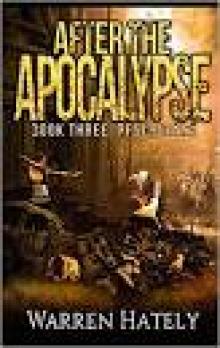 After the Apocalypse Book 3 Resurgence: a zombie apocalypse political action thriller
After the Apocalypse Book 3 Resurgence: a zombie apocalypse political action thriller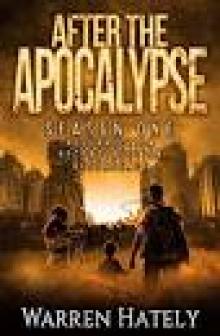 After The Apocalypse Season 1 Box Set
After The Apocalypse Season 1 Box Set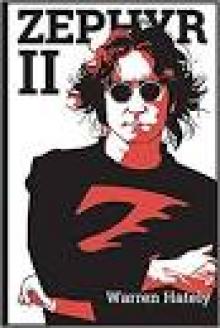 Zephyr Box Set 2
Zephyr Box Set 2 Zephyr Box Set 1
Zephyr Box Set 1 Endless Night
Endless Night After the Apocalypse Book 1 Resurrection: a zombie apocalypse political action thriller
After the Apocalypse Book 1 Resurrection: a zombie apocalypse political action thriller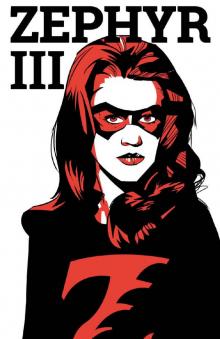 Zephyr III
Zephyr III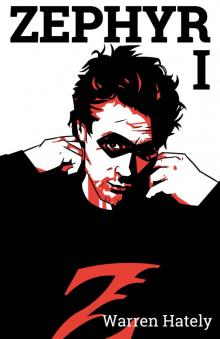 Zephyr I
Zephyr I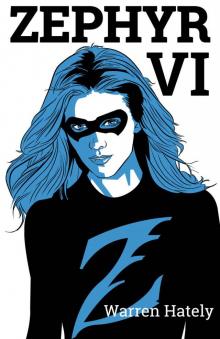 Zephyr VI
Zephyr VI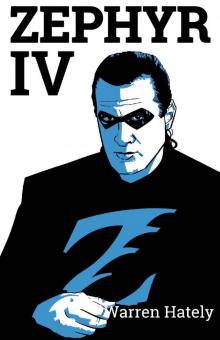 Zephyr IV
Zephyr IV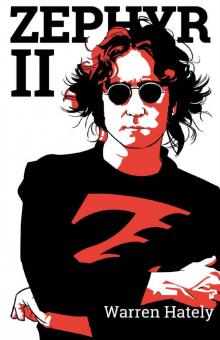 Zephyr II
Zephyr II